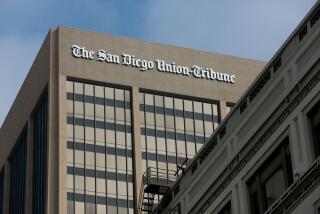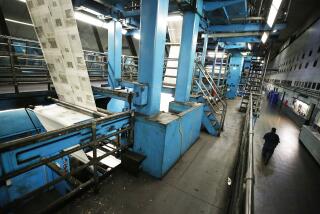Tribune debt may force asset sales
- Share via
The unexpectedly stiff borrowing terms that Tribune Co. accepted in its plan to go private are likely to increase the chance of significant asset sales by the Chicago-based media company, debt experts say.
The company has already announced plans to sell the Chicago Cubs baseball team after the end of the season. With revenue flagging and repayment on the first round of debt required quickly, Tribune could sell or spin off other assets, including real estate or its stakes in the popular Food Network or CareerBuilder website.
On Friday, Tribune spokesman Gary Weitman said the company’s businesses -- including the Los Angeles Times, Chicago Tribune and more than 30 other newspapers and TV stations -- generate cash flow “more than adequate to meet the payment needs of the loans.” But he added: “Between cash flow and the sale of noncore assets, which could include real estate, we are in a good position to meet our future debt obligations.”
An individual close to the company, who spoke on condition of anonymity, said it was doubtful that such sales would include such lucrative and expanding franchises as the Food Network or CareerBuilder.
Billionaire real estate investor Sam Zell engineered the restructuring of Tribune, which utilizes more than $12 billion in debt to transfer control of the company from public shareholders to an employee stock ownership plan. Zell’s eventual investment of $315 million would give him the right to later acquire as much as 40% of the company.
Tribune said last week that it had secured the initial $8 billion to finance the deal. The purchase of Tribune stock is to be completed later this year with an additional $4 billion in borrowing.
Tribune had planned to repay the $8 billion over seven years. But difficulty obtaining financing prompted it to slice off $1.5 billion into a separate issue that must be repaid within two years, although it carries a slightly lower interest rate.
Flagging revenue in the newspaper industry made the debt market skeptical of the overall deal and drove up the interest rates available to the company.
Tribune could pay as much as $660 million a year in interest on the loans under terms reached with bond buyers last week. Tribune’s interest rates will apparently be half a percentage point higher than anticipated. If applied to the entire $8-billion borrowing, the differential would cost the company $40 million a year -- a sizable piece of its more than $1 billion in annual cash flow.
Bond traders said it was necessary to break the $8 billion into two issues to attract buyers in a market that had begun to view the borrowing more skeptically, in part because of deteriorating results in April among Tribune’s newspapers and the industry generally. But the size of the Tribune package, some suggested, would have made it hard for the market to digest in the best circumstances.
The accelerated repayment requirements place more pressure on the company to sell non-core assets that don’t produce substantial cash flow, debt experts familiar with the deal said.
The Cubs are expected to attract vigorous bidding and sell for as much as $750 million.
Tribune already had arranged the $73-million divestiture of two of its papers in Connecticut, the Advocate of Stamford and Greenwich Time. But Tribune said Friday that the deal had fallen apart because the prospective buyer, Gannett Co., declined to accept the terms of an existing union contract with workers at the Advocate, as an arbitrator required last month.
Tribune said it would immediately begin seeking another buyer for the papers.
james.rainey@latimes.com
More to Read
The biggest entertainment stories
Get our big stories about Hollywood, film, television, music, arts, culture and more right in your inbox as soon as they publish.
You may occasionally receive promotional content from the Los Angeles Times.











